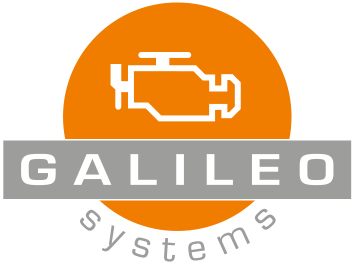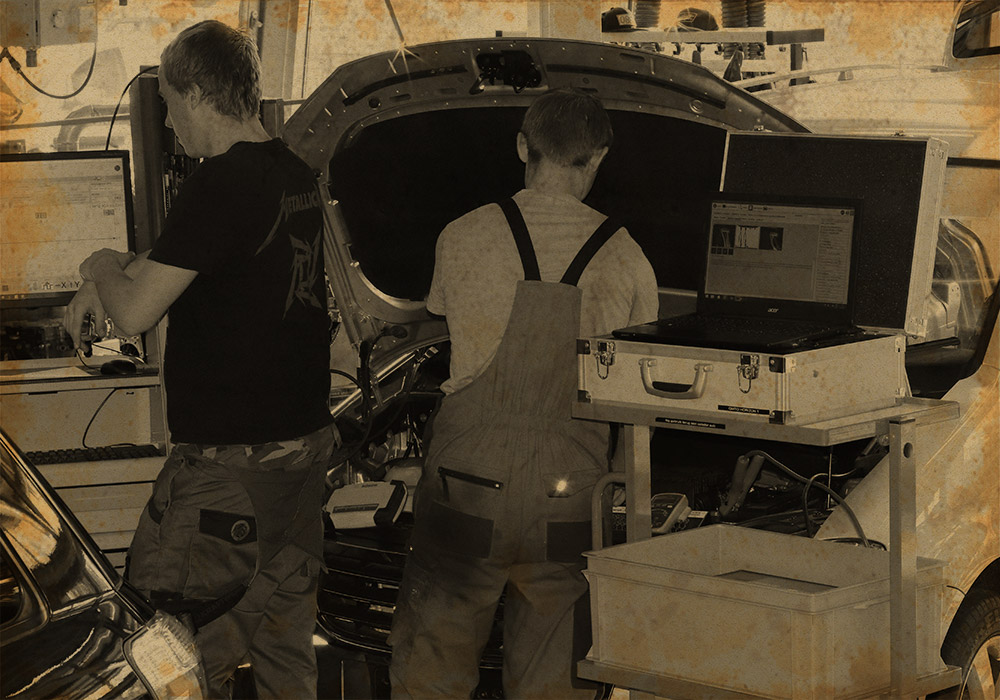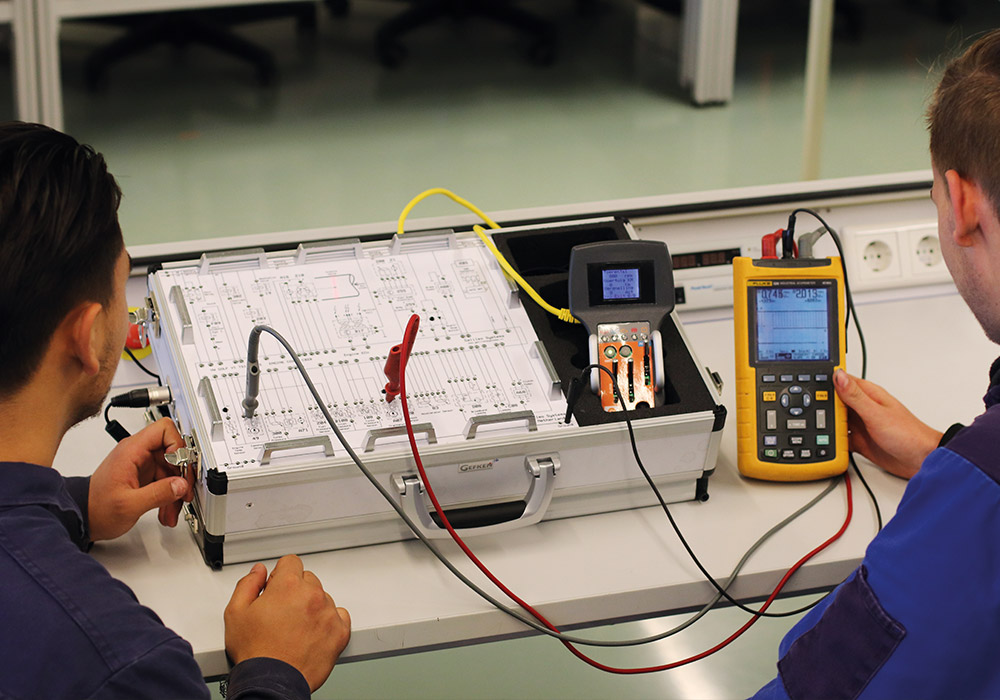A unique training systeem for the automotive technician
Automotive Diagnostic
Training System
A new educational systeem:
the unique link between theoretics en practical work!
Galileo now seamlessly combines theoretical training with the highest level of practical problem solving in a realistic and pedagogical way, creating better understanding, greater everyday recognition and by far a more accelerated learning.
Usually many faults and errors can be found using diagnostic tools with good coverage in brands, models, systems etc. But far from all problems can be solved by reading fault codes. Troubleshooting always requires good skills, knowledge in different automotive systems and electronics, the right technical information and advanced testing equipment to quickly and precisely track down a tricky problem.
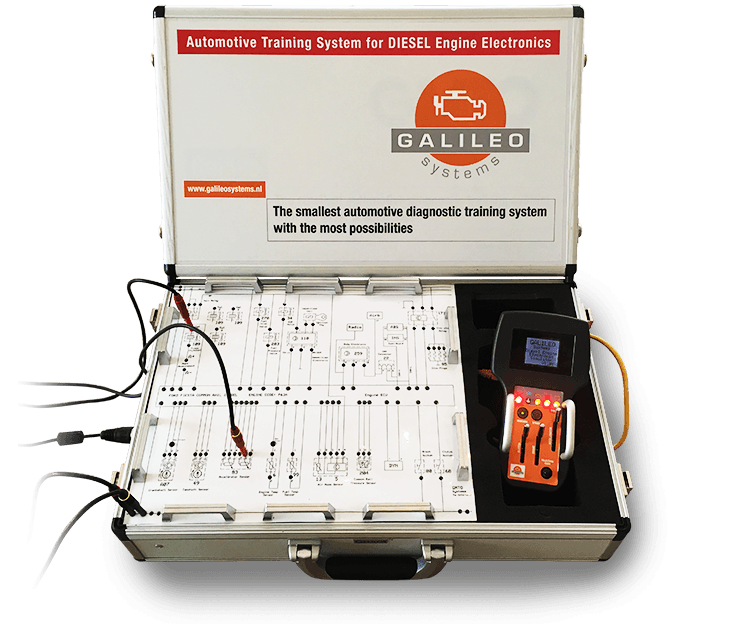
Galileo, the new training philosophy
Galileo Systems has developed the Galileo training system, an advanced simulation system offering a completely new, unique and cost-effective way to teach automotive technicians.
OLD SITUATION
Cars in the classroom
-
Much Space needed
-
Dangerous (hot, rotating parts)
-
No driving conditions or limited
-
Limited problem simulations
-
Fixed location
-
Expensive with preparations
-
Sometimes unclear fault codes
NEW SITUATION
Galileo simulators
-
Up to 10 cars in one suitcase
-
All driving conditions possible
-
All levels of training
-
Including Built-in Scan Tool and Gas Analyzer
-
At least 150 assignments per system
-
Much cheaper than a prepared car
-
Extensive problem simulations (up to 150)
-
100-150 physical measurement points
-
Portable, practice and theoretical lessons
Galileo, Automotive simulation system
Advanced simulation system
Galileo Systems has developed the Galileo training system, an advanced simulation system offering a completely new, unique and cost-effective way to teach automotive technicians. It has long been known that the most effective method to educate a mechanic is through practical work with “tools”. Galileo now seamlessly combines theoretical training with the highest level of practical problem solving in a realistic and pedagogical way, creating better understanding, greater everyday recognition and by far a more accelerated learning.
Tracking down tricky problems
Usually many faults and errors can be found using diagnostic tools with good coverage in brands, models, systems etc. But far from all problems can be solved by reading fault codes. Troubleshooting always requires good skills, knowledge in different automotive systems and electronics, the right technical information and advanced testing equipment to quickly and precisely track down a tricky problem.
Spot on repairs are an asset for every garage
In order to be a profitable workshop, not only making enough money to survive but being able to invest in the future, the workshop must minimize, or preferably eliminate every non-billable minute of troubleshooting. A garage well known for its knowhow and spot on repairs immediately generates goodwill and a growing customer base.
Simulators are just beter
Why simulators instead of real cars?
The question is legitimate, but the answers obvious!
Real cars are expensive, after the upgrades needed for educational purposes even more so. Training facilities among several other things, require garage doors, big open spaces and a quiet exhaust extraction system. Therefore, practicing on real cars can usually only be done in a few selected locations which cause the majority of the participating workshops to suffer from costly overnight trips. As a result, many of the training sessions have been cancelled, leaving the workshops and their mechanics uneducated.
Galileo is suitable for classroom operation of the systems, sensors and actuators to explain and make visible. Additionally, all functions concerning the use and the potential of a diagnostic tester (reader) to teach effectively.
Additionally, training vehicles either run (more than in idle or low revs) or could be driven under loaded conditions without access to a rolling road.
Furthermore simulated driving can be observed and diagnosed by many students at the same time without high levels of noise and no danger of rotating or hot parts.
Galileo, the new training philosophy
Automotive Simulation System GALILEO
After years of experience with troubleshooting various vehicle systems, training and manufacturing modular training simulators, Galileo Systems has now developed a new type of simulators. The older training simulators were equipped with real components, making them bulky and heavy but especially time-consuming and costly to manufacture. The new series of simulators is more compact, flexible and most importantly; cheaper and easier to manufacture.
Basic system with lost of possibilities
The new design makes the simulator very easy to transport as the base unit fits in a standard briefcase and weighs only 5 kilograms. It can also easily be adapted to various automotive systems. For example, simulating an older multipoint injection system with conventional electromagnetic injectors and a minute later you can run a modern direct injection system with piezo injectors! Furthermore, add a full simulation of environmental exhaust after treatment and you have a fully functional vehicle in a briefcase!
More systems
In addition to various gasoline systems the Galileo Simulation System also offers diesel systems, ABS, Air Condition, CAN bus, hybrid and electric vehicles, lighting, electric power steering etc. By simply shifting the “wiring diagram” (over layer) the simulator automatically configures itself to a completely different system. Depending on the wiring diagram attached, the simulator will change all the simulated values to be realistic and consistent with the desired system.
Hand held control module
In addition to this, the system also includes a hand held control module. Depending on the selected system (EMS, Airco, ABS, etc.) the module can control all functions as desired. The controller includes a “dashboard” (display, LED indicators, ignition and starter), “pedals” (accelerator, brake and clutch) and “steering wheel” (3D joystick). Features such as engine load (accelerating), cornering (steering), gear shifting, fuel cut-off, cruise control, etc. can be simulated but also added with different kinds of drivability problems. Even the difficulty level of troubleshooting can be selected as different causes to a problem can be chosen (wiring, connectors, sensors, actuators, pressure, temperature etc.). Even short problems can be made in all components and wiring.
Also a diagnostic tool
The control module also works as a diagnostic tool; as in real life you can read and erase trouble codes, monitor live data, readiness tests and much more. Even software download procedures can be simulated. Different diagnostic methods and tools can now be evaluated. Use the built-in diagnostic tool and/or a regular multimeter – but you are not going to discover and verify the trickiest of problems without an oscilloscope! Standard is Galileo equipped with 20 selectable problems from simple to very nasty ones even with now and then occurrence. Extendable to 150 problems per system.
Galileo Lite
Galileo Lite can be used as a stand-alone system training. The emphasis lie in discovering the automotive waveforms and the relationship between the various components. The student can independently carry out a large package measuring tasks and record the results. The best way is to do the measurements with an automotive scope. The use of a scope is clarified in this way.
Theory, practice and different techniques can now seamlessly be united making education interesting, engaging and effective; high skill level + low price = value for money!
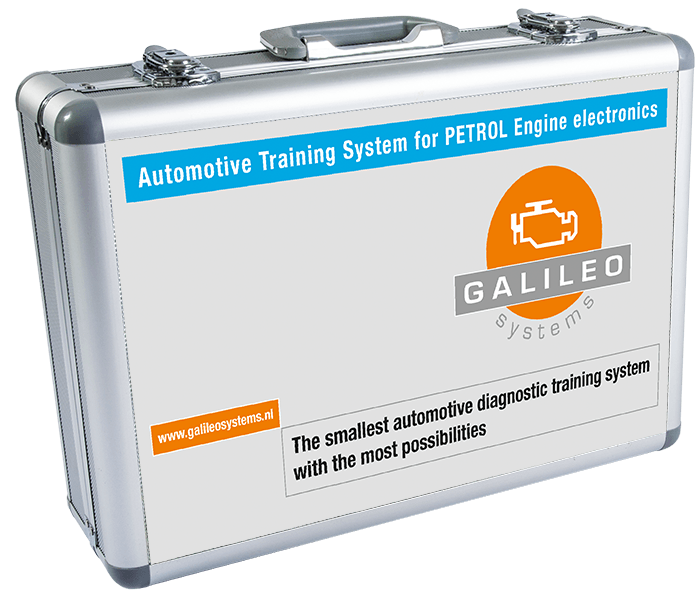
Handy case can accommodate up to 10 different vehicles per system.
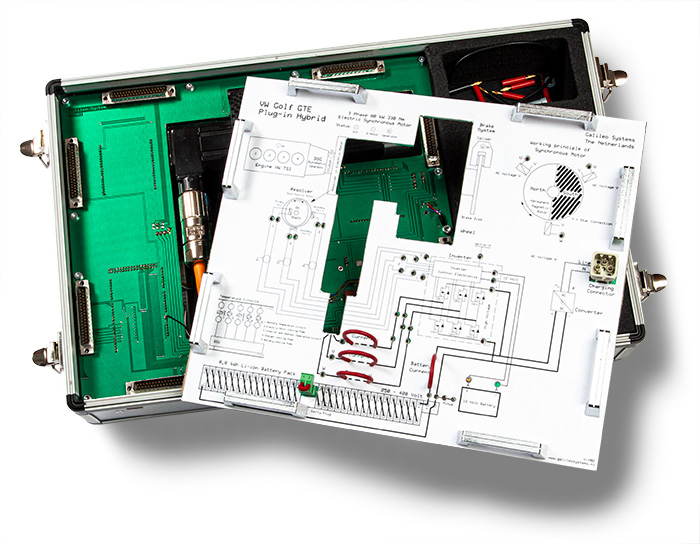
Other automotive system create by swapping measuring plate with drawing and measuring points.
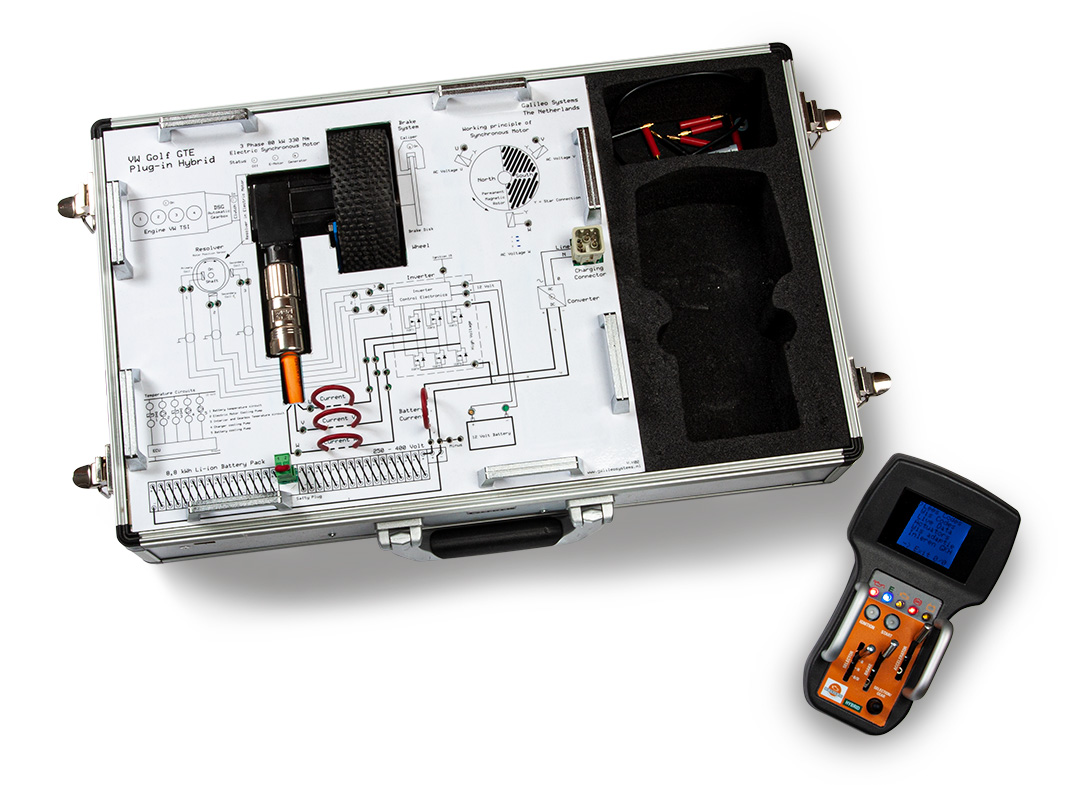














Galileo, the new training philosophy
The current range of the Galileo systems

Petrol system
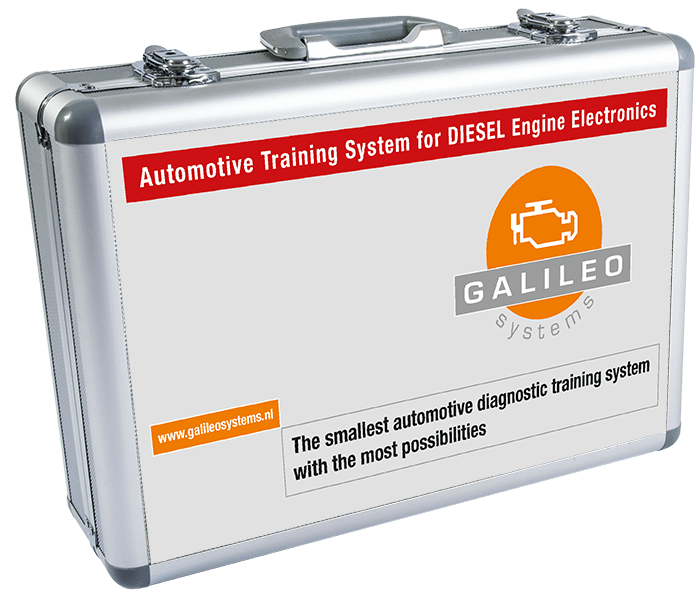
Diesel system
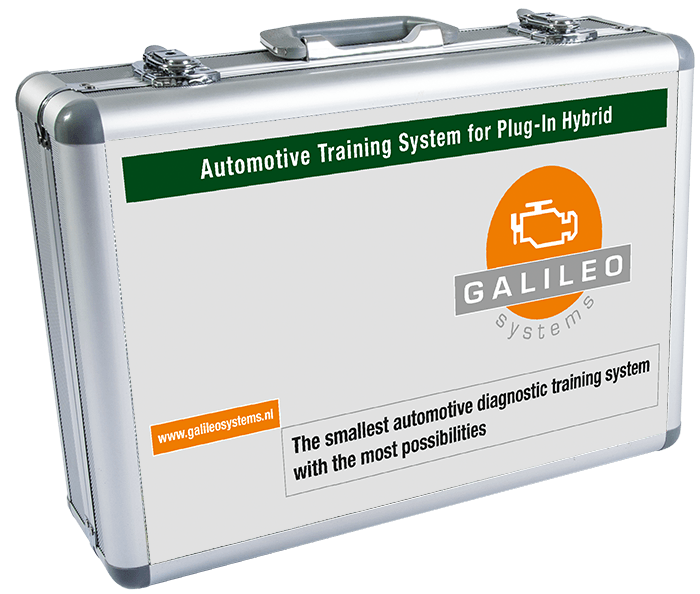
Hybrid system
